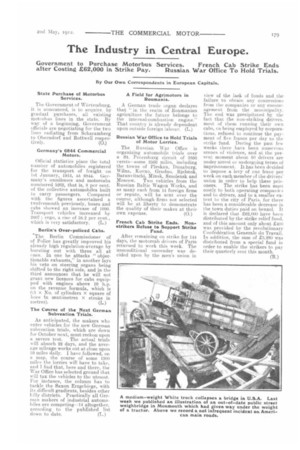The Industry in Central Europe.
Page 19

If you've noticed an error in this article please click here to report it so we can fix it.
Government to Purchase Motorbus Services. French Cab Strike Ends after Costing £62,000 in Strike Pay. Russian War Office To Hold Trials.
By Our Own Correspondents in European Capitals, State Purchase of Motorbus Services.
The Government of Wiirtemburg, it is announced, is to acquire, by gradual purchases, all existing motorbus lines in the state. By way of a beginning, Government officials are negotiating for the two lines radiating from Scharamberg to Oberndorf and Rottwell respec tively. (0-) Germany's 6844 Commercial Motors.
Official statistics place the total number of automobiles registered for the transport of freight on 1st January, 1912, at 6844. Germany's omnibuses and motorcabs numbered 5262, that is, 8 per cent. of the collective automobiles built to carry passengers. Compared with the figures ascertained a twelvemonth previously, buses and cabs showed an increase of 1000. Transport vehicles increased by 2607 : ergo, a rise of 58.2 per cent.,
which is very satisfactory. (L.) Berlin's Over-policed Cabs.
'The Berlin Commissioner of of Police has greatly improved his already high regulation-average by bursting out with three all at once, in one he attacks " objectionable exhausts," in another lays his veto on steering organs being shifted to the right side, and in the third announces that he will not grant new licences for cabs equipped with engines above 10 h.p. on the revenue formula, which is 0.3 x No. of cylinders X square of bore in centimetres X stroke in metres). (L.)
The Course of the Next, German Subvention Trials...
As anticipated, the makers who enter vehicles for the new German subvention trials, which are down for October next, must reckon upon a severe test. The actual trials will absorb 22 days, and the average mileage works out at close upon 59 miles daily. I have followed, on a map, the course of some 1300 miles the lorries will have to take, and T find that, here and there, the War Office has selected ground that will tax the vehicles to the utmost. For instance, the column has to tackle the Saxon Erzge.birge, with its difficult gradients, besides other hilly districts. Practically all German makers of industrial automobiles are competing---14 altogether, according to the published list
down to date. (E.)
A Field for Agrimotors in Roumania.
A German trade organ declares that 'in the realm of Roumanian agriculture the future belongs to the internal-combustion engine." That country is already dependent upon outside foreign labour. (L.) Russian War Office to Hold Trials of Motor Lorries.
The Russian War Office is organizing automobile trials over a. St. Petersburg circuit of 3800 yersts—some 2600 miles, including the towns of Pleskau, Dunaburg, Wilna, Kovno, Grod no, Bjelstok, Baranvitschi, Minsk, Smolensk and Moscow. Two vehicles from the Russian Baltic Wagon Works, and as many each from 14 foreign firma or repute, will be sent over the course, although firms not selected will be at liberty to demonstrate the quality of their makes at their own expense. (0.)
French Cab Strike Ends. Nonstrikers Refuse to Support Strike
Fund.
After remaining on strike for 144 days, the motorcab drivers of Paris returned to work this week. The unconditional surrender was decided upon by the men's union in view of the lack of funds and the failure to obtain any concessions from the companies or any encouragement from the municipality. The end was precipitated by the fact that the non-striking drivers. most of them running their own cabs, on being employed by corporations, refused to continue the payment of five francs per day to the strike fund. During the past few weeks there have been numerous scenes of violence, and at the present moment about 50 drivers are under arrest or undergoing terms of imprisonment. It has been decided to impose a levy of one franc per week on each member of the drivers' union in order to help these prisoners. The strike has been most costly to both operating companies and to drivers, and to a smaller extent to the city of Paris, for there has been a considerable decrease in the town duties paid on benzol. It is declared that. 262,000 have been distributed by the strike relief fund, and of this amount only about £400 was provided by the revolutionary Confederation Generale du Travail. In addition, the sum of 23,280 was distributed from a special fund in order to enable the strikers to pay their quarterly rent this month.




























